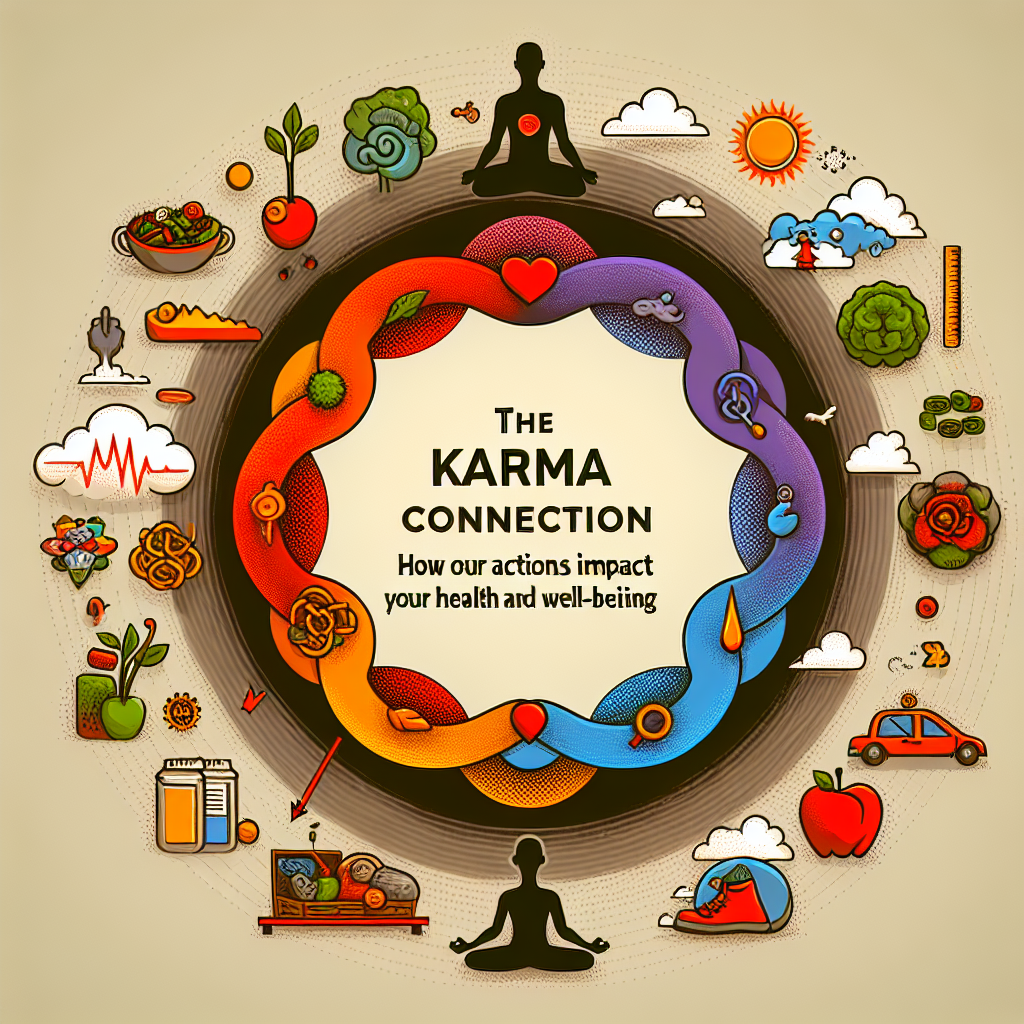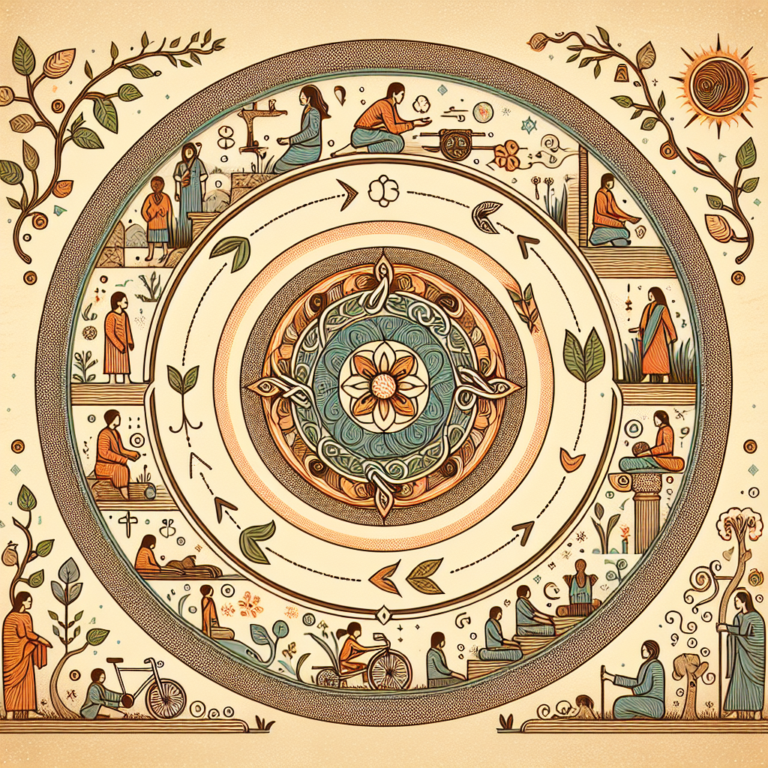The Karma Connection: How Our Actions Impact Our Health and Well-Being
The concept of karma, originating from Eastern philosophies, particularly Hinduism and Buddhism, suggests that every action has consequences – a cosmic balance of cause and effect. Simply put, the energy we put out into the world ultimately comes back to us, shaping our experiences, relationships, and even our health. In a world increasingly focused on personal responsibility and holistic well-being, understanding the connection between our actions and our health can help us lead more fulfilling lives.
The Philosophy of Karma
At its core, karma emphasizes that our actions – whether good or bad – generate energy that affects our lives and the lives of others. This energy often translates into mental, emotional, and physical states. For instance, engaging in compassionate, altruistic actions can cultivate a sense of purpose and interconnectedness, while selfish or harmful behavior can lead to anxiety, guilt, and physical ailments.
Beyond philosophical beliefs, the psychological and physiological implications of our actions have been supported by various studies. The link between mind and body is a central theme in both modern psychology and traditional Eastern medicine, suggesting that our emotional and mental states can directly impact our physical health.
The Impact of Positive Actions
Engaging in positive actions such as kindness, generosity, and compassion not only benefits others but also has profound effects on our well-being. When we perform acts of kindness, our brain releases neurotransmitters like serotonin and oxytocin, which are associated with feelings of happiness and bonding. This biochemical reaction not only enhances our mood but also boosts our immune system, lowers stress levels, and even increases longevity.
Moreover, helping others fosters a sense of belonging and community. Social connections are invaluable for mental health, and positive interactions can combat feelings of isolation and depression. In essence, when we contribute positively to the well-being of others, we simultaneously nurture our own.
The Detrimental Effects of Negative Actions
Conversely, negative actions such as deceit, harm, or selfishness can lead to a cascade of negative health outcomes. Engaging in harmful behavior often results in feelings of guilt, anxiety, and regret. These feelings manifest as increased stress levels in our bodies, potentially leading to chronic health issues such as hypertension, heart disease, and digestive problems.
Moreover, negative actions can create cycles of retaliation or conflict, which not only affect our mental health but also disturb our social relationships. Conflict often leads to feelings of distrust and isolation, which further exacerbate mental health challenges. The ramifications of our negative actions can echo throughout our lives, creating a ripple effect that impacts our physical well-being as much as our emotional state.
The Mind-Body Connection
The connection between karma, our actions, and health can be understood through the lens of psychosomatic medicine, which studies the connection between psychological factors and physiological responses. Stress, anxiety, and depression are known to have direct correlations with physical ailments, illustrating the profound impact our mental and emotional states can have on our physical health.
For example, those who maintain a positive outlook and engage in fulfilling activities often experience lower levels of inflammation, a key factor in many chronic diseases. In contrast, individuals trapped in cycles of negative behavior or thought patterns are more susceptible to chronic pain, autoimmune disorders, and other health-related issues.
Creating a Positive Karma Cycle
Understanding the karma connection encourages us to cultivate a positive cycle of actions that foster health and well-being. Here are some practical strategies to enhance our personal karma:
Practice Mindfulness: Staying present can help us become aware of our actions and their consequences. Mindfulness allows us to reflect on whether our actions align with our values and the kind of energy we wish to contribute to the world.
Engage in Altruism: Participate in community service, support friends, or simply smile and greet strangers. Altruistic acts can significantly enhance your mood and create a sense of fulfillment.
Cultivate Gratitude: Regularly expressing gratitude can shift our focus from negative to positive, promoting psychological well-being and resilience.
Foster Positive Relationships: Surround yourself with individuals who uplift and inspire you. Healthy relationships enhance emotional support and contribute to better health outcomes.
Reflect on Choices: Regularly reflecting on our decisions can help us guide our actions toward more positive outcomes, creating a conscious awareness of how we influence ourselves and the world around us.
- Volunteer for Causes You Care About: Engaging in activities that align with your values not only amplifies feelings of satisfaction but also connects you with like-minded individuals.
Embracing a Holistic Approach
The journey toward reinforcing the karma connection is inherently holistic. It requires us to integrate our physical, emotional, and mental health. Holistic practices, such as yoga, meditation, and mindfulness, can enhance our awareness of how our actions impact our well-being. By adopting a holistic lifestyle, we not only improve our health but also create positive ripples in our communities and the world.
Conclusion
The karma connection highlights the intrinsic relationship between our actions, our mental well-being, and our physical health. In understanding this concept, we can adopt more positive behaviors that promote not only our own health and happiness but also contribute to the collective well-being of all. By prioritizing kindness, compassion, and personal responsibility, we can create a virtuous cycle that enlivens our lives and the lives of those around us.
FAQs
1. What is karma?
Karma is the principle that every action has consequences, impacting not only the individual performing the action but also the lives of others.
2. How do positive actions affect health?
Positive actions, such as kindness and altruism, can enhance mental well-being by reducing stress and anxiety, and even promote physical health by boosting the immune system.
3. Can negative actions impact my health?
Yes, engaging in negative actions or maintaining harmful thought patterns can lead to increased stress, anxiety, and even chronic health conditions.
4. What can I do to create positive karma?
Practicing mindfulness, engaging in acts of kindness, fostering gratitude, and surrounding yourself with positive influences are effective ways to create positive karma.
5. How does mindfulness relate to health?
Mindfulness encourages awareness of one’s thoughts and actions, promoting a positive mindset and reducing stress, which can lead to improved health outcomes.
By embracing the karma connection, we can cultivate better health, enrich our lives, and foster a more harmonious world around us.
It seems like you might want to provide a prompt or ask for help with something specific. Could you please share more details or clarify what you’re looking for?, #Karma #Connection #Actions #Impact #Health #WellBeing, #Karma #Connection #Actions #Impact #Health #WellBeing, 1734477308, the-karma-connection-how-our-actions-impact-our-health-and-well-being





